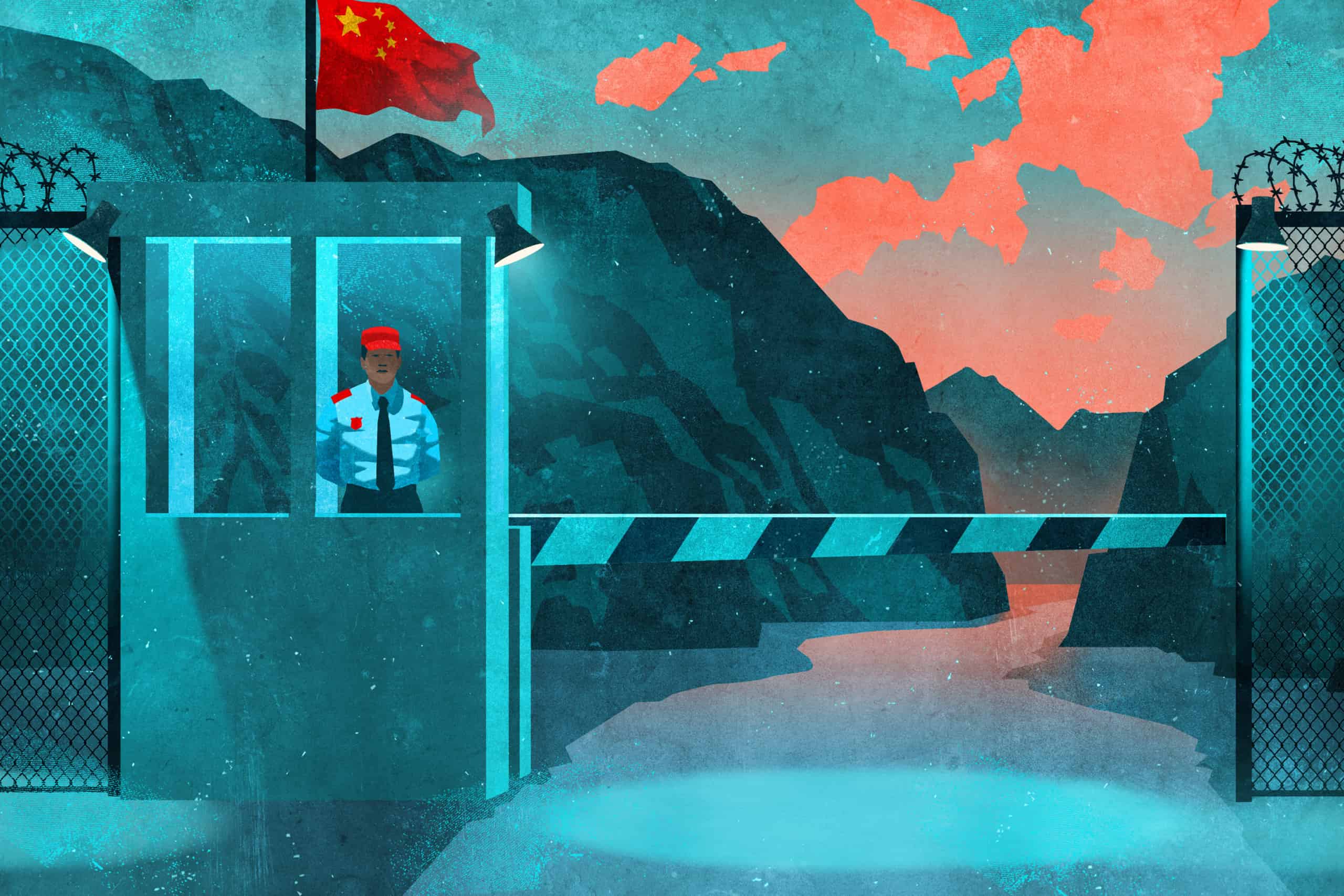
Night had fallen in the Democratic Republic of the Congo’s South Kivu province. It was late November, and the air was sticky even after the sun had set.
Breathtaking amounts of gold sit just beneath the surface of South Kivu’s muddy slopes, which rub up against the border with Burundi, Rwanda and Tanzania. But above ground, violence from warring militias plague the province, with thousands of murders and abductions occuring over the last five years.
That November night was no exception: at a remote gold mine in the village of Mukera, just ten miles from the shores of Lake Tanganyika, five Chinese nationals were kidnapped.
Little is known about the identity of the attackers or the Chinese miners, but the incident came at a tough time for the Chinese companies in the region. A few months earlier, South Kivu authorities had shuttered the operations of several Chinese companies operating there, citing environmental damage and permit issues.
In response to the attack, the Chinese embassy released a notice that Chinese citizens should evacuate from the area for safer parts of the Democratic Republic of the Congo (DRC). All Chinese citizens and Chinese businesses in the Congo should, the embassy wrote, “pay close attention to local conditions, increase their safety awareness and emergency preparedness, and avoid unnecessary outside travel.” Emphasizing that the Chinese government would have little ability to launch rescue missions, the embassy stressed that remaining citizens “will be personally responsible for all consequences.”
Despite this grim warning, Chinese businesses hoping to continue participating in the gold rush weren’t entirely alone. Just over a month later, in early January, the Chinese Enterprises Association, an industry group for Chinese businesses, invited Frontier Services Group (FSG), a Hong Kong-based private security company, to conduct security training for 73 Chinese companies operating in the country. In a press release, FSG said that the training would cover “safety awareness, emergency drills and emergency response.”
FSG certainly has experience in security issues. Founded in 2014 by the notorious American mercenary Erik Prince and backed by CITIC Group, one of the most significant Chinese state-owned conglomerates, FSG is one of the premier private security companies for Chinese firms operating abroad.

The company’s growth in recent years has been notable and is a reflection of China’s aspirations to have a more assertive and confident global presence. Indeed, calling in FSG to help the Chinese miners in the DRC echoed the plot line of Wolf Warrior II, one of the highest grossing Chinese blockbusters ever. In the film, the main character is a Chinese military commando turned mercenary who travels to Africa and is called on to save Chinese and Africans in grave danger. The final image of the film shows a Chinese passport, with the message: “Citizens of the PRC: When you encounter danger in a foreign land, do not give up! Please remember, at your back stands a strong motherland.”
From Chinese miners in the DRC to Chinese commercial fishermen off the coast of Somalia, state-backed security companies like FSG are increasingly being called in to save the day.
There are about 8,000 Chinese private security companies (PSCs), according to analyst estimates, but only a few dozen that operate overseas. The industry, which is still young, is a direct result of Chinese appetite for foreign ventures. Over the past two decades, Chinese investment and construction abroad has ballooned — totalling $2.2 trillion worldwide since 2005 — with much of it concentrated in mining and infrastructure in, at times, risky operating environments. Nine Chinese oil workers were killed in Ethiopia in 2007, for instance; 13 Chinese sailors were massacred on the Mekong River along the Myanmar-Thailand border in 2011; and three Chinese textile workers were killed in Zambia in 2020.
“Due to China’s relative isolation in the last century, the country was not, until recently, dealing with widespread distant security threats to Chinese nationals in faraway lands,” says Liu Qing, the director of international business for Huaxin Zhongan (HXZA), a Chinese private security company. “Now, with China’s rise, infrastructure projects worldwide and Chinese-led networks throughout the Belt and Road Initiative countries, Chinese assets and Chinese nationals have become highly attractive targets in the eyes of bad guys.”
Now, with China’s rise, infrastructure projects worldwide and Chinese-led networks throughout the Belt and Road Initiative countries, Chinese assets and Chinese nationals have become highly attractive targets in the eyes of bad guys.
Liu Qing, director of international business for Huaxin Zhongan, a Chinese private security company
Liu says his company’s clients are mostly Chinese state-owned companies involved in heavy industry, construction, telecommunications, energy, manufacturing, and logistics — and that demand is growing “exponentially.” Yet for all the attention that has been paid to the economic and political implications of Chinese presence in the developing world, analysts say that little focus has been placed on the private security companies like FSG and HXZA that are key to China’s success overseas.
“PSCs seem very niche, but actually the more you look into them, it is a huge issue,” says Christopher Galvin, head of communications and outreach at the International Code of Conduct Association (ICOCA), a Geneva-based organization that sets up international guidelines for the private security industry. “The global industry over the last 10 to 15 years has exploded because of rising insecurity, scarcity of resources, and a claw back of state provision of security. In some countries, private security outnumbers state security. Security is being outsourced.”
This trend has ramifications for China, which has long adhered to a foreign policy doctrine of “non-interference.” Beijing is extremely reluctant to deploy its military overseas, even as its state-owned companies fan out across the globe through the Belt and Road Initiative (BRI). According to Paul Nantulya, a research associate at the Africa Center for Strategic Studies, a think tank within the U.S. Department of Defense, “Chinese leaders have had to develop a blended security response” to bridge that disconnect.
Chinese private security contractors are decidedly not mercenaries or military contractors, like Prince’s infamous firm Blackwater. Most Chinese PSCs do not even use guns, in accordance with Chinese law. But Nantulya still laments that scholars and U.S. government officials do not focus more attention on Chinese PSCs given their outsized importance to China’s foreign policy and overseas investments. Chinese private security companies, he notes, are not only required by law to be majority state-owned — making the label of “private” a bit of a misnomer — but some experts believe they may also have a larger presence abroad than China’s military, the People’s Liberation Army (PLA).1 The Wire was unable to find data to validate this claim.
“China is experimenting with this model to relieve pressure on the PLA,” he says. “It has to balance a very ambitious foreign policy with this aversion to deploying the PLA, and a lot of that demand is falling on these firms.”
TWO PRINCES

Compared to their international peers, Chinese private security companies are relative latecomers to the industry. Mark Ma, the CEO of Hanwei International Security Services, a Hangzhou-based private security company, says the industry has thus far gone through three stages: confusion, development, and now, practice. In his telling, the Chinese industry has not yet reached the “mature period,” like industry leaders in the U.S., UK, Israel and Russia.
Still, Chinese PSCs had virtually no overseas operations two decades ago, and the industry’s growth in recent years was helped along, in part, by Erik Prince, one of the best-known names in the security contractor business. A former U.S. Navy SEAL, Prince founded U.S.-based Blackwater in 1997, and it quickly became one of the largest contractors for the State Department and CIA. But in 2007, contractors from Blackwater (now called Academi) opened fire on a group of Iraqi civilians while escorting a U.S. embassy convoy. The incident killed 17 people and ignited a furious backlash about contractors’ operations in Iraq.
In the wake of that controversy — which resulted in an F.B.I. investigation, the resignation of two top State Department employees involved in oversight of Blackwater, and the Iraqi government banning Blackwater from operating in the country — Prince left Blackwater’s headquarters in swampy North Carolina and, in 2014, established his new venture, Frontier Services Group, on the 39th floor of a shiny, gold skyscraper with views of Hong Kong’s Victoria harbor.
“He used to wrap himself with the flag and get millions in contracts in the process,” says Sean McFate, an expert on private security and military contractors, and a former military contractor himself. “Then the [Iraq] incident happened, which brought scrutiny to Blackwater. Then China knocked on his door.”
He used to wrap himself with the flag and get millions in contracts in the process… Then the [Iraq] incident happened, which brought scrutiny to Blackwater. Then China knocked on his door.
Sean McFate, an expert on private security and military contractors and former military contractor
FSG was formed by taking over a Hong Kong-listed financial services company owned by Johnson Ko, a Hong Kong investor, and initially, its goal was to provide logistics services for Chinese companies in Africa, profiting in the process.
“This is not a patriotic endeavor of ours — we’re here to build a great business and make some money doing it,” he told the Wall Street Journal just after the company was started. “This is a very rational decision — made, I guess, emotionless.”
Nevertheless, FSG’s founding team had serious U.S. military power. Prince convinced William J. Fallon, a Navy admiral who formerly served as head of U.S. Central Command, to join the board. Gregg Smith, a former Marine, came on as CEO, and Peter Phillips, a former Navy SEAL, joined as Chief Operating Officer.
It also had serious Chinese investors. With the help of Johnson Ko, who had inked deals with Alibaba’s Jack Ma and landed on the Forbes list of 50 richest Hong Kongers in 2016, Prince secured an investment from CITIC, which had already been a significant investor in Ko’s previous venture, and two CITIC executives were named to the board of directors, according to company filings.
Fallon says the company was initially pitched to him as a transportation and logistics company in Africa, with services like contracting planes or developing plans for shipping raw materials. But, along the way, FSG took on more security operations, such as hiring guards to patrol mining sites and armed escorts for the company CEO. The original idea, Fallon says, was a good one. “It should’ve been successful,” he told The Wire. “The problem was Erik couldn’t stay out of security.”
According to Omri Cohen, who was managing director for FSG’s East Africa operation until he stepped down in 2020, Prince’s security expertise was exactly what FSG’s Chinese investors and board members were interested in. With extensive experience in combat scenarios, Prince could bring something to the table that few Chinese could. Chinese citizens are not allowed to carry guns, and the Chinese military has little experience planning and carrying out tactical operations. Prince, on the other hand, knows his way around a war zone.
“The Chinese in FSG were very keen to go into security, because that is what they wanted,” Cohen says. “The fact that Erik Prince was the chairman, the Chinese thought it would add a lot of value when they could put his name next to the agenda.”
But Prince’s name also comes with a fair amount of controversy. In 2016, by which point Prince’s sister, Betsy DeVos, had been appointed as Donald Trump’s education secretary, an Intercept investigation found that Prince was attempting to use FSG to sell private military services and helicopters to various African nations, including Libya, which is subject to U.N. and U.S. sanctions. While it is unclear whether any countries ended up buying the services, his actions led to a federal investigation, including into his potential ties to Chinese intelligence, according to the Intercept. The F.B.I. investigation appears to be ongoing, but a U.N. investigation concluded that Prince violated the Libya arms embargo. The F.B.I. told The Wire it “can neither confirm nor deny conducting particular investigations.”

In the aftermath, Fallon and Smith, the CEO, resigned from FSG, but the company’s China ties remained strong. In 2017, for instance, FSG bought a 25 percent stake in a school on the outskirts of Beijing that it claimed would become the “largest private security training school in China.” In a press release, Prince said that the training camp was set up because it is “vital that there is a local facility that can help companies better prepare their workforce for operating across One Belt One Road Regions in Asia and Africa.” The school’s website describes training courses for police and military functions, and the faculty of the school is made up of former police and PLA officials.
FSG further blurred the lines between the commercial security industry and Chinese state interests in 2019, when FSG announced plans to open a security training camp in Xinjiang’s Tumxuk, a city controlled by the Xinjiang Production and Construction Corps, which is known to carry out human rights abuses against the minority Uyghur population. Prince said at the time that he had no knowledge of the plan, which was later dropped.
Prince had been demoted to deputy chairman of FSG’s board in 2018, after the company raised $107 million from CITIC; China Taiping Insurance Group, a state-owned Hong Kong-based conglomerate and one of China’s first insurers; and Trinity Gate, a company owned by Teng Songrong, the former CEO of an investment arm of the China Development Bank. Chang Zhenming, the former chairman of CITIC, was made chairman, and according to the most recent corporate filings, those three companies remain the top three shareholders — with CITIC controlling 25.9 percent of the company.2At one point, Erik Prince held about 7 percent of FSG, though the most recent annual report does not disclose whether he has a stake. He resigned from his positions in April 2021.
The result has been steady growth, with FSG securing contracts for some of China’s biggest commercial projects overseas. In Southeast Asia, for instance, FSG started providing security services for the China-Laos railway in 2018, and in 2020, the company inked a deal with the Bank of China’s Phnom Penh branch in Cambodia, to provide “physical protection, technical defense, cash escort and emergency response.” In Africa, FSG landed the contract to provide “comprehensive security services” for the Sicomines Project in the DRC, one of the largest Chinese mining projects in Africa.
Last year, FSG solidified its top position by acquiring one of its largest Chinese competitors, DeWe International Security Group, for $25 million and installing its politically-connected CEO as head of FSG.3Li Xiaopeng served as head of security for the 2008 Beijing Olympics.
Now with 1,376 employees, the company has more than doubled in size since 2019, and it boasts offices in Hong Kong, Beijing, Shanghai, Nairobi, Faisalabad, Vientiane and Dubai. Even with the Covid-19 pandemic making a dent in things, FSG still reported close to $40 million in revenue in the first six months of 2021, according to filings, a 17 percent increase from the year before.
Despite things seemingly going well, Prince resigned from the company last year under unclear circumstances. FSG did not respond to requests for comment, and Prince declined to comment for this article, telling The Wire that he had “parted ways” with the company.
With its American founder and executives gone, FSG is now firmly a Chinese private security company, which Alessandro Arduino, a principal research fellow at National University of Singapore’s Middle East Institute and a longtime observer of the Chinese PSC industry, says is how the Chinese executives want it.
“Five years ago I would have said, they want to be like us. When I went to Beijing to meet with Chinese PSCs, the executives were racing to show me a photo of them and Erik Prince and they gave me an autographed copy of his book in Chinese,” he says. “Now, they are looking for a ‘Chinese way’ for the PSC industry.”
THE ‘WIN-WIN’ APPROACH

While it was the U.S. wars in Afghanistan and Iraq that catapulted Erik Prince into something of a household name, it was the U.S. retreat from Afghanistan last August that seems to have piqued Western interest in Chinese firms like FSG. Some observers speculated that the Chinese, including Chinese security contractors, would fill the void left after over two decades of American military presence. Alarmist headlines said that Afghanistan represented “An ‘early test case’ for a China-led world,” and analysts wrote breathless pieces about how Afghanistan was the “next frontier for Chinese private security companies.”
But Chinese PSCs are unlikely to enter a place like Afghanistan for one simple reason: they aren’t like their American counterparts. Despite the fact that one of the most prominent Chinese firms was started by the founder of Blackwater, the Chinese private security industry is far less muscular. Experts say that Beijing’s hands-off approach to overseas conflict trickles down into the PSC industry in myriad ways, which, in general, is a good thing.
“Beijing knows well that armed contractors can cause a huge reputation issue,” says Arduino. “They are trying to sell the ‘win-win’ Belt and Road narrative.”
Indeed, so far, efforts to more closely follow the U.S. model have fallen on deaf ears. Han Fangming, a former member of the Chinese People’s Political Consultative Conference, an important political advisory body, and board member of prominent companies like Air China and Sinohydro Corporation, publicly advocated for more policy support for the industry back in 2015. After 29 Sinohydro employees were kidnapped in Sudan in 2012, he argued that the government should increase training opportunities, facilitate visas, and allow Chinese PSCs to carry guns abroad. The think tank he founded, Charhar Institute, put out a detailed report on potential reforms to the industry in 2015.
“With Chinese people all over the world and Chinese companies operating all over the world, political risks in any place and internal disputes in any country may bring unexpected risks,” Han wrote in a 2015 article. “A world-class enterprise needs a world-class security company. More opportunities should be given to Chinese security companies, allowing them to operate armed and to protect China’s overseas interests in actual combat.”
But Beijing demurred, which some analysts argue is a relief. Such a shift, says McFate, the private security expert, would signal a broader diplomatic and military shift inside China. “If the Chinese enter the industry in a serious way, it will have shockwaves,” he says. “It would signal to me that they are changing their way of warfare in troubling ways. But it has not been their M.O. so far, and they have had the opportunity.”
Instead, Beijing seems content to let PSCs exist in a kind of regulatory gray zone. While the Ministry of Public Security regulates domestic PSC activity, it is unclear what government department directly supervises these companies abroad. The confusion manifests most obviously in the use of firearms since the use of guns by Chinese PSC employees outside of China is not directly addressed by Chinese law.
The Chinese PSCs that The Wire spoke with said that they mostly did not use guns, unless in certain situations, such as when Chinese companies provide security for ships due to the particularities of maritime law. According to Hanwei’s Ma, some Chinese PSC employees secure firearm licenses from the host nation or get around the issue by hiring local workers to carry out the operational duties. This approach, Ma says, helps the company integrate into the host country — while reinforcing Beijing’s commitment to a mutually beneficial foreign policy.
“We realize each country has its own specialties and uniqueness,” he says. “So we decide to form a cooperation mechanism of mutual benefits and win-win results with local partners when we enter into new areas.”
Analysts say this approach likely includes a mix of coercion (thanks to the firms’ close ties to the state), back channel deals and even bribery — a kind of “soft” rather than “hard” power.
“For a lot of the large, politically-connected Chinese state-owned enterprises, they have this whole architecture behind them,” says Eric Olander, the head of the China Africa Project, a nonprofit media organization. “In many instances, the host state will provide them with protection and put the word on the street for trouble makers to keep their distance. U.S. and other foreign companies generally don’t get that kind of treatment.”
For a lot of the large, politically-connected Chinese state-owned enterprises, they have this whole architecture behind them… In many instances, the host state will provide them with protection and put the word on the street for trouble makers to keep their distance.
Eric Olander, head of the China Africa Project, a nonprofit media organization
Given the lack of combat exposure in the Chinese military, which is the primary hiring pool for Chinese PSCs, contracting out the operational roles to local staff may be for the best. “They are not very experienced — the PLA doesn’t have much operational experience,” says Helena Legarda, an analyst at MERICS who wrote a report on Chinese private security companies. “And it is Beijing that will have to respond if something goes wrong.”
Arduino argues that in order to prevent mishaps, and their subsequent backlash, the Chinese government should screen Chinese PSCs and only allow select firms with the appropriate capabilities to operate in high-risk environments to go abroad. He also says that more Chinese companies should engage with Geneva-based ICOCA, the international regulatory body which provides certification to companies that comply with their human rights, due diligence, and risk-reducing guidelines. So far only two Chinese companies — HXZA and Hanwei International Security Services — have joined the organization.
Such professionalization of the industry could help it mature and give more Chinese companies the confidence to expand globally. But, for the moment at least, the “blended” or “soft” power security model of PSCs like FSG seems to be working for China and Chinese businesses. As Olander notes, even though the DRC is a wildly unstable and violent environment, Chinese companies have been able to run a mining empire there without much problem.
“Whatever they are doing,” he says, “they are doing something right.”

Katrina Northrop is a journalist based in Washington D.C. Her work has been published in The New York Times, The Atlantic, The Providence Journal, and SupChina. @NorthropKatrina



